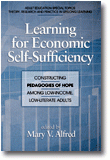
Learning for Economic Self-Sufficiency
Constructing Pedagogies of Hope Among Low-Income, Low-Literate Adults
Edited by:
Mary V. Alfred, Texas A&M University
A volume in the series: Adult Education Special Topics: Theory, Research and Practice in LifeLong Learning. Editor(s): Kathleen P. King, University of Central Florida.
Published 2010
In a most timely volume addressing many of the connections among current fiscal and employment crises to adult education, Learning for Economic Self-Sufficiency highlights the problems and challenges that low-literate adults encounter in various environments. Moreover, this book presents strategies for addressing the chronic illiteracy among low-income workers. The power of this volume is that the reader gains a holistic view of the complexities of educating a population of low-literate adult learners from various life conditions. From language literacy issues in corrections, the workplace and access to higher education, and migrant workers literacy learning barriers, to technology literacies, and consumerism myths, Learning for Economic Self-Sufficiency goes far deeper than prior volumes in exploring the complex scope of issues face by low-income, low-literate adults as they seek learning for economic self-sufficiency.
The overall objective of the book is to help readers explore economic self-sufficiency for low literate and low-income adults from various contexts and the role of adult and higher education in developing these learners for greater economic independence. Noting that literacy is only a first step to economic, mental, and physical health as well as responsible citizenship, each chapter provide specific case examples and recommendations to educators and trainers of adults for creating learning programs and environments to facilitate the development of a more literate and economically stable population.
CONTENTS
Introductory Chapter--Low-Income, Low-Literate Learners in Adult Education: A Portrait, Mary V. Alfred and Noelle Eason. Promises and Challenges for Institutions of Higher Education in Educating Low-Income Adult Learners, Catherine A. Hansman. The Role of the Community College in Redirecting Careers of Low-Literate, Low-Income, and Low-Skilled Citizens, Liliana Mina, Deryl Davis-Fulmer and Regina Smith. Riches from the Poor: Teaching Humanities in the Margins, Janet Groen and Tara Hyland-Russell. Using Technology to Improve Pedagogy and Empowerment with Low-Literacy Adults, Kathleen P. King. The Connection Between Health Literacy and Adult Literacy in Developing Economic Self-Sufficiency, Lilian H. Hill. Adult Learners in Urban Communities: Challenges and Opportunities for Economic Independence, Larry L. Martin. No Worker Left Behind: Providing Low-Wage Workers Equitable Access to Workplace Learning, Laura L. Bierema. The Role of the Black Church in Developing Congregants for the Workplace, E. Paulette Isaac-Savage. Learning on the Move: Migrant Workers in Adult Education, Aida A. Nevárez-La Torre. Consumption, Gendered Stereotypes, and the Struggle for Respect: Controlling Images of Poor Women as Consumers in Popular, Political, and Adult Education Discourses, Jennifer A. Sandlin. Learning for Self-Sufficiency Among Immigrants in Canada: The Role of Community-Based Adult Education, Shibao Guo. Literacies from the Inside: Learning From and Within a Culture of Corrections, Dominique T. Chlup and Irene C. Baird. Beyond Education and Training: The Role of Social Capital in Developing Economic Self-Sufficiency, Mary V. Alfred.
-
Paperback978-1-61735-110-5
Web price: $45.04 (Reg. 52.99)
-
Hardcover978-1-61735-111-2
Web price: $80.74 (Reg. 94.99)
- eBook9781617351129

- EDU002000 - EDUCATION: Adult & Continuing Education
- EDU015000 - EDUCATION: Higher
- EDU037000 - EDUCATION: Research
-
 A Feast of Learning
International Perspectives on Adult Learning and Change
A Feast of Learning
International Perspectives on Adult Learning and Change
-
 Conversations about Adult Learning in Our Complex World
Conversations about Adult Learning in Our Complex World
-
 Developing and Sustaining Adult Learners
Developing and Sustaining Adult Learners
-
 Literacy as Gendered Discourse
Engaging the Voices of Women in Global Societies
Literacy as Gendered Discourse
Engaging the Voices of Women in Global Societies
-
 Organization and Administration of Adult Education Programs
A Guide for Practitioners
Organization and Administration of Adult Education Programs
A Guide for Practitioners
-
 Organization and Administration of Adult Education Programs
A Guide for Practitioners 2nd Edition
Organization and Administration of Adult Education Programs
A Guide for Practitioners 2nd Edition
-
 Our Stories, Ourselves
The Embodyment of Women’s Learning in Literacy
Our Stories, Ourselves
The Embodyment of Women’s Learning in Literacy

